EVOLUTION, BIOLOGY, AND POLITICS
Peter K. Hatemi and Rose McDermot t
the university of chicago press chicago and london
peter k. hatemi is associate professor of political science, microbiology, and biochemistry at Pennsylvania State University and a research fellow at the United States Studies Centre at the University of Sydney. rose mcdermott is professor of political science at Brown University. She is the author of numerous books, including Presidential Leadership, Illness, and Decision Making .
The University of Chicago Press, Chicago 60637 The University of Chicago Press, Ltd., London 2011 by The University of Chicago All rights reserved. Published 2011. Printed in the United States of America 20 19 18 17 16 15 14 13 12 11 1 2 3 4 5
isbn -13: 978-0-226-31909-4 (cloth) isbn -13: 978-0-226-31910-0 (paper) isbn -10: 0-226-31909-1 (cloth) isbn -10: 0-226-31910-5 (paper)
Library of Congress Cataloging-in-Publication Data
Hatemi, Peter K.
Man is by nature a political animal : evolution, biology, and politics / Edited by Peter K. Hatemi and Rose McDermott.
p. cm . Includes bibliographical references and index . isbn -13: 978-0-226-31909-4 (cloth : alk. paper ) isbn -10: 0-226-31909-1 (cloth : alk. paper ) isbn -13: 978-0-226-31910-0 (pbk. : alk. paper ) isbn -10: 0-226-31910-5 (pbk. : alk. paper )
Biopolitics. 2. Political sociology. 3. Evolution (Biology) and the social sciences. 4. Sociobiology. I. McDermott, Rose, 1962 II. Title. ja h 38 2011 306.2dc22
2010048791
 The paper used in this publication meets the minimum requirements of the American National Standard for Information SciencesPermanence of Paper for Printed Library Materials, ansi z 39.48-1992.
The paper used in this publication meets the minimum requirements of the American National Standard for Information SciencesPermanence of Paper for Printed Library Materials, ansi z 39.48-1992.
Deep friendship is universal and universally important. For a book devoted to the study of individual variance in the context of human universals, we would like to dedicate our efforts to those very few individuals whose true friendship have blessed us with universal sustenance and comfort, even in the worst of times. We treasure their place in our lives, close to our hearts.
Content s
Foreword i x James Druckma n
Acknowledgments x v Introduction Peter K. Hatemi and Rose McDermot t
Evolution as a Theory for Political Behavior 13
Peter K. Hatemi and Rose McDermot t Political Primates: What Other Primates Can Tell Us about th e
Evolutionary Roots of Our Own Political Behavior 4 Darby Proctor and Sarah Brosna n
Formal Evolutionary Modeling for Political Scientists 72
Oleg Smirnov and Tim Johnson Modeling the Cultural and Biological Inheritance of Social and Political
Behavior in Twins and Nuclear Families 101 Lindon J. Eaves, Peter K. Hatemi, Andrew C. Heath, and Nicholas G. Martin
Gene-Environment Interplay for the Study of Political Behaviors 185
Jason D. Boardma n Genes, Games, and Political Participation 20
James H. Fowler, Peter J. Loewen, Jaime Settle, and Christopher T. Dawe s The Mind-Body Connection: Psychophysiology as an Approach t o
Studying Political Attitudes and Behaviors 22 Kevin B. Smith and John R. Hibbin g
Hormones and Politics 247
Rose McDermott
| vii |
Testosterone and the Biology of Politics: Experimental Evidence from the
2008 Presidential Election 26 Coren L. Apicella and David A. Cesarin i
From SCAN to Neuropolitics 273
Darren Schreibe r Conclusion 30
Peter K. Hatemi and Rose McDermot t Index 30
Foreword
James Druckman
There were few aspects of my childhood as predictable as the subject of our dinner conversations. The discussion invariably gravitated to the topic of na ture versus nurture, with the point being that all one is springs from his or her environment. As a product of my upbringing, I came to share this belief. Another fundamental lesson from my social psychologist father concerned the importance of rigorous demonstration of evidence that satisfied the high est of scientific standards. For much of my career as a social scientist, these two values rarely, if ever, generated dissonance. But that has changed. The last several years have seen a dramatic rise, across the social sciences, in ap proaches that ground themselves in the fundamentals of human biology, including physiology and genetics. No social science discipline has been un touched; indeed, one might have imagined that the most resistant would be sociology, yet a 2008 special issue of the American Journal of Sociology entitled Exploring Genetics and Social Structure suggests otherwise. In some ways, politi cal science has lagged behind. The present volume is an attempt to make up ground and move political science forward in the consideration of these ap proaches to explain important political phenomena.
The scholars at the forefront of this movement, including all the authors in this book, are careful, thoughtful, and rigorous scientists. It is for this reason that I find myself in a state of conflict: the substance of the argument counters my inclinations but the evidence, while like all research subject to critique, appears beyond reproach when it comes to serious, honest efforts to reveal social and political dynamics. While I am not yet sure where this leaves my thinking (other than uncomfortably conflicted), I am certain that reading this volume would behoove the entire discipline: critics need to assess what the approach offers at this point, supporters will learn of the latest fi ndings and trends, and agnostics will want to know of a movement making its presence felt throughout academia and beyond (e.g., Lynch with Laursen 2009).
When I contemplate the larger research agenda on biology and politics, a number of considerationssome of which I am sure are more thoughtful than otherscome to mind. In what follows, I discuss these considerations. These points are not meant as a checklist to be addressed in an individual study
| ix |
or even an entire volume of studies. Rather, they constitute a nonexhaustive and nonexclusive set of parameters with which one can assess the collective research endeavor. The points discussed also could apply to any emergent ap proach; for example, they map quite nicely onto the concerns that permeate debates about rational choice. My motivation for presenting them here is to provide a rudimentary framework for readers as they make their way through the volume.
My first point involves the basic questions being addressed: are they politi cally interesting? To many, the question of whether biological processes (e.g., genetics) impact political attitudes and behaviors is of tangential interest. It is akin to asking a question about a possible independent variable, and proba bilistically, if one searches long enough, he or she will fi nd signifi cant cor relations. A more compelling approach is to identify a topic of interest and develop a theory on why there may be a biological link. While extant work some of which is discussed in this volumehas done this (e.g., work on the genetics of cooperation), it is critical to clarify the contribution to a general understanding of the phenomenon under study. Is adding a biological compo nent akin to identifying an omitted variable? Is it isolating a more fundamen tal causal force that is mediated by other, nonbiologically measured variables? Is it reorienting the entire theory by replacing existing explanations? In short, there must be a substantive rationale to stimulate scholars interested in the political variable under study (e.g., cooperation, an attitude) to care about bi ology. If that involves more than adding another variable to the explanation (without altering what we already know), even better.

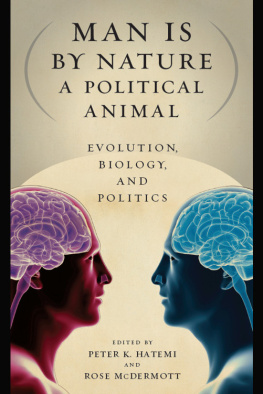

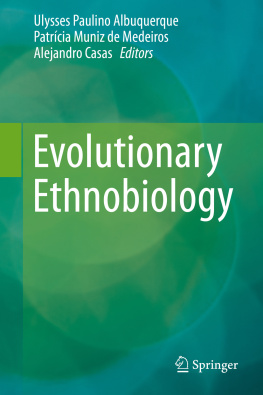
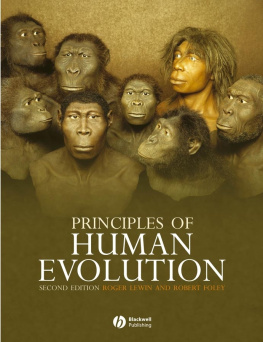
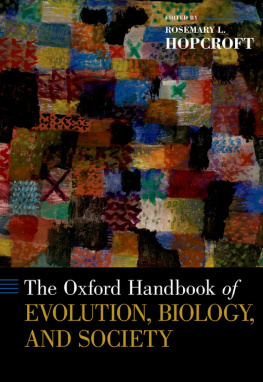
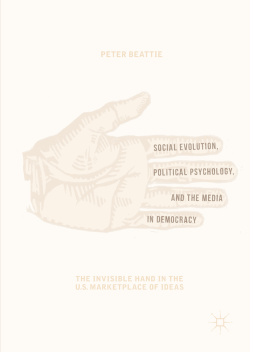
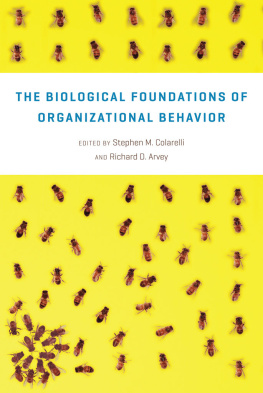
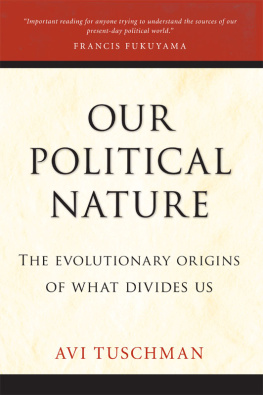
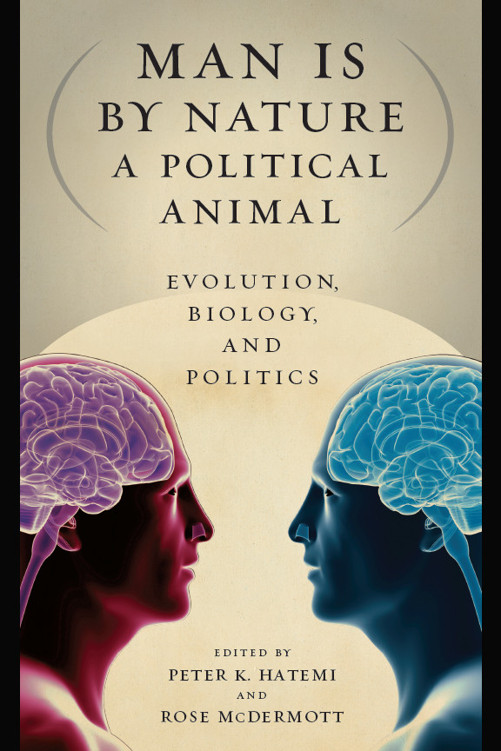
 The paper used in this publication meets the minimum requirements of the American National Standard for Information SciencesPermanence of Paper for Printed Library Materials, ansi z 39.48-1992.
The paper used in this publication meets the minimum requirements of the American National Standard for Information SciencesPermanence of Paper for Printed Library Materials, ansi z 39.48-1992.